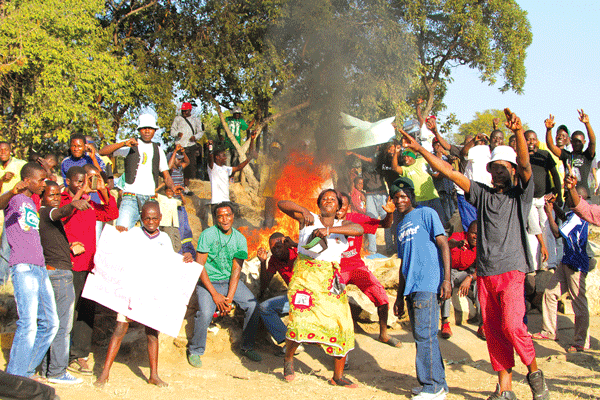
EIGHTEEN-YEAR-OLD Timothy is engaged in normal teenage routines and pastimes, hopeful about the future. But this was not always the case.
BY OWN CORRESPONDENT
There was a time when Timothy did not believe he would live another day amid intense fear, hopelessness and displacement when he was still an eight-year-old boy.
This was in the run-up to the June 2008 presidential election run-off where President Robert Mugabe was the sole candidate after MDC-T leader Morgan Tsvangirai withdrew from the race due to State-sponsored violence. Timothy recalls one day when a truckload of political activists descended on their homestead in Mazungunye village in Bikita, Masvingo.
Upon hearing the sound of the approaching vehicle at a time when tension and danger already lurked in the highly politicised area, Timothy’s grandmother sneaked into the house and instructed him to lock the door from outside and get in through the window to give the impression that no one was at home.
The assailants pounded on the door, but upon realising that the door was locked from the outside, they assumed that the occupants had fled and so they left. That night, Timothy and his grandmother slept in the bush.
For two long weeks, the would-be assailants would return daily. And for those two weeks, Timothy and his grandmother would spend nights in the bush, where dangerous wild animals prowled.
But on one fateful day, doors and roofing of their homestead were destroyed and young Timothy was just in time to warn his grandmother to escape. For five days, Timothy was left alone at the deserted homestead for five days, scared to death and helpless.
- Chamisa under fire over US$120K donation
- Mavhunga puts DeMbare into Chibuku quarterfinals
- Pension funds bet on Cabora Bassa oilfields
- Councils defy govt fire tender directive
Keep Reading
Desperate and young, he thought that was the end of him, but a week later, a caring neighbour managed to smuggle him to Masvingo town to re-unite him with his grandmother, who had somehow made her way there.
The incident traumatised Timothy to an extent that when they returned to the village some time later, he refused to sleep in the house fearing the perpetrators would return.
His life was in disarray as fear consumed him. He could no longer attend school because he feared that the perpetrators would attack him. His grandmother finally had no choice, but to move him to another town to stay with an uncle and attend school.
In 2014, Timothy was one of the 11 children between the ages of 11 to 17, who attended a three-day survivors’ camp conducted by Zimbabwe Peace Project (ZPP) with support from DANIDA.
ZPP, through its project on monitoring politically-motivated violence identified the children, each of whom had either witnessed violence being perpetrated on their family members or who were themselves victims of politically-motivated violence.
“Children’s witnessing of violence is frequently overlooked by law enforcement officers, families and others at the time of the incident, and yet literature around children and violence indicates that exposure to violence disrupts the healthy development of children and its effects can last for years after the hostilities,” ZPP national director Jestina Mukoko says.
The survivors’ camp, which was run as a pilot project, was aimed at mitigating the impact of violence on children. ZPP obtained consent from the parents and guardians of the selected children and also engaged Counselling Services Unit, an organisation that has expertise in both psychotherapy and pharmacology therapy to assist with the healing process for the children.
The survivors’ camp activities included documenting the history of what happened through interviews. According to ZPP, when sensitive questions were asked and the child was uncomfortable to respond, the counsellor would ask the parent/guardian to vacate the room.
Sensitive questions asked included the use of drugs and sex indulgence by the children. Once left alone with the counsellor, the children were seen opening up more. Some of the children admitted they had used drugs as a coping mechanism with the trauma they experienced.
Assessments by the counsellor and psychologists were followed by medical assessment by a medical doctor. From both assessments, some of the children were referred to a psychiatrist for psychiatric treatment and a number were referred for individual counselling depending on their specific needs.
A group session with parents and guardians was carried out during the camp in order for them to deal with the emotions that came up. The group session was designed to help reduce isolation and the feeling of being alone in the storm of trauma.
The group session sought to establish the victims’ coping mechanism and the needs they required in order to give support to their child, particularly psychological needs. A second survivors’ camp was held and the same children attended.
Timothy was happy that he was identified as a participant to attend the survivors’ camp.
“I am happy that someone was able to listen to me and to understand how everything that happened made me feel,” Timothy said after the camp.
According to camp facilitators, Timothy enjoyed the activities at the camp as well as the opportunity to meet with other survivors of violence. “This made me realise I was not the only one who went through what I did,” he said.











